Hi, my name is Calum Douglas, professionally I'm a mechanical engineer - with a slight hint of "writer" in the mix. I`ve been writing a technology history book about Second World War aircraft engines for nearly 5 years and have presented my book-research at the engineering departments of two of the biggest Formula One motor-racing teams and also smaller amateur societies all over the world. In short, by virtue of the investigative work I have done - I now know my subject.
If you like what you see here, you can follow my research on my website (where you can sign up for free to see interviews I have done) or my facebook page where I post research stories weekly.
https://www.facebook.com/TheSecretHorsepowerRace/
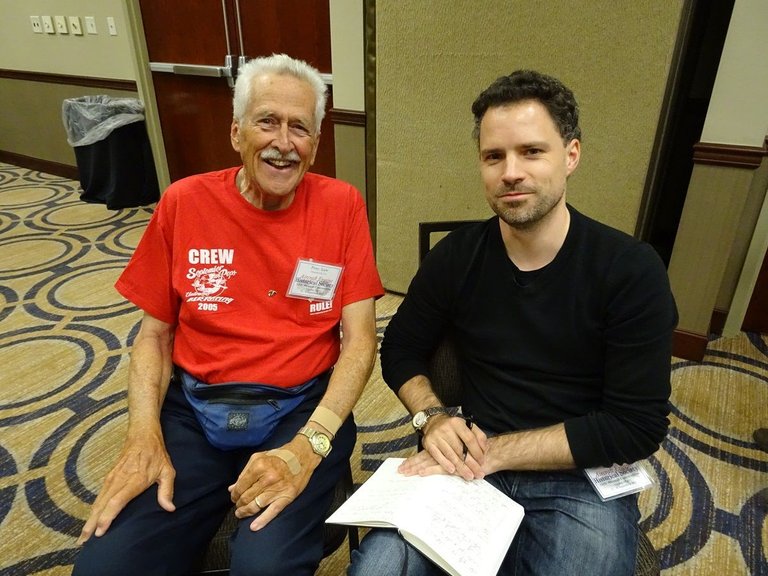
[Me with Pete Law who I met in Ohio when I presented my research to the Aircraft Engine Historical Society in America. It turns out Pete is a legendary aeronautical engineer, having been head of Thermodynamics at Lockheed Martin Skunkworks where he headed up the thermal systems design of the famous SR71 Blackbird Spyplane.]
Eight years ago I had never even written a magazine article, let alone a book - and didnt know much more than anyone with the History Channel would know about how technology was developed three quarters of a century ago. How did I make the change, and what have I learned about researching, history and writing that might be useful to you? Maybe you are toying with writing a book about something, or perhaps your blog posts are getting progressively longer and demanding more in depth research to provide quality to your readers. I can maybe help you out.
I am obsessed with history, and specifically how aviation technology was developed in the wars of the last century. I have been buying and reading books on every aspect of it for 20 years, but only after I started trying to write my own book did I start to see writing, publishing, research and the life of an author in an entirely different light.
I had grown up reading very entertaining books about the big air-combats of the Second World War, the Battle Of Britain featuring near the top. Once I had started writing by own book, I realised that I had been reading the wrong books. I remember reading a fascinating story in one book, which I wanted to learn more about, as the writer had been interested in a slightly different aspect of this event. How was I going to do it ? I looked at the back of the book for the Notes or References section...nothing. Then it hit me, the book I had enjoyed for so many years had left absolutely NO trace what-so-ever of where ANY of the information it was writing about had actually come from! I realised in 20 seconds that about half the books in my bookshelf could, for all I knew - be entirely fictitious accounts written after reading a few paragraphs of Biggles, or somesuch comedic propoganda.
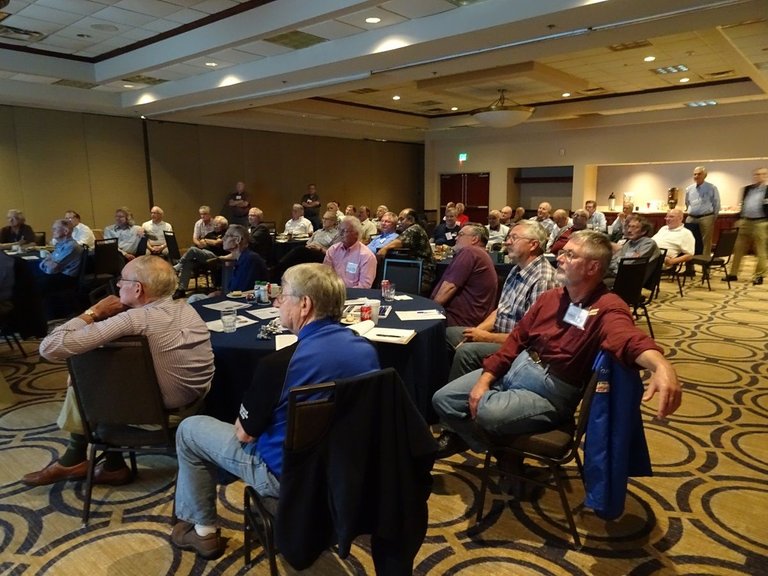
[A room full of retired aeronautical engineers and mechanics is a pretty good place to find out if you are on the money with your research - always present your work even very early on during writing your book]
On the other side of the coin, some less immidiately engaging books I owned had almost the last quarter of the book filled with references, which I as a pure reader, had studiously ignored as irrelevant, boring or not useful to me, a non-historian.
How wrong I was, the references in these few well researched books, by authors who had taken tremendous pains to document not only their own views, but WHERE all their raw information was from - were each worth a thousand times more than a great yarn without a document number in sight. I began doing something I had never done, reading the notes at the back of a book !! These notes showed me where I could start looking at real archives all over the world where all the actual original historical papers were stored. I soon realised the true value, of this - the authors had quoted tiny sections from a few letters, the real reports sometimes ran to hundreds of pages; and contain vast reams of correspondence, technical detail and facts totally unknown to anybody.
[I discovered a vault where every technical document captured from Germany and Japan in 1945 is still kept here in Britain !]
I frequently open dockets of papers to find the tiny discs of paper from the hole-punch drop out on the table, you know then - that you are reading something that nobody else has read in maybe fifty years. Instantly the notion that any book on the subject that claims to have been an authority, was nothing of the sort. The author's hadn't even been to read the real letters themselves, but had just copied fragments from other authors, and missed out on a treasure trove of incalculable value. Virtually nothing from these hidden vaults of knowledge has been digitised, thousands of years of history, REAL history is all still on paper hidden in sealed storage rooms. If you think the age of the computer has brought us more knowledge you are mistaken, it has brought us the SAME knowledge faster and more easily, fooling us into thinking google can tell us a secret.
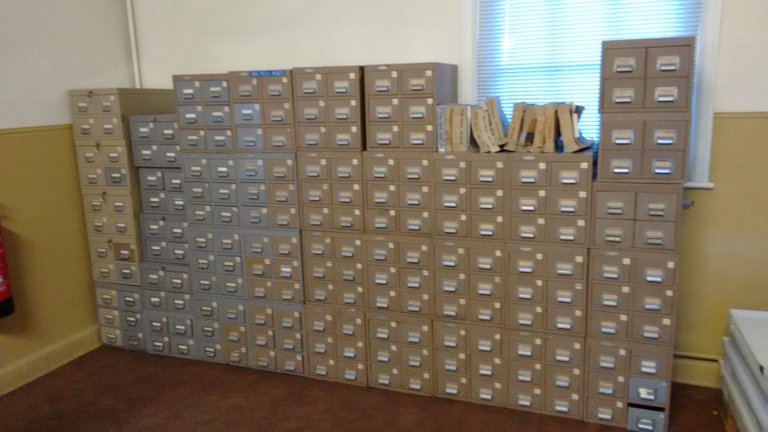 [Thats right - EVERY technical advance in aviation completed in Germany and Japan in the entire Second World War, is indexed on library cards - not google. You will not write any respected book that will still be the standard on any subject in years to come unless you visit old dusty archives and put in the hours]
[Thats right - EVERY technical advance in aviation completed in Germany and Japan in the entire Second World War, is indexed on library cards - not google. You will not write any respected book that will still be the standard on any subject in years to come unless you visit old dusty archives and put in the hours]
Like most of the best things, the secret to research is - that there is no secret. The books which contain genre defining breakthoughs were not because the author was lucky or clever - it was because they spent years travelling the world reading original documents and not regurgitating books by amalgamating 20 others to form one new one with their name on it.
The next time you are in a book-shop looking for a good read, skip the front cover, skip the text - go straight to the back and look for the references. The book without any is just entertainment, the book brimming with notes is one that somebody spent the best years of their lives making for you. Choose wisely!
Once you start doing all this, presenting your findings regularly (even if you think you are not ready!) - it's now time to put out the feelers on forums and other places, sending people messages to ask for contacts. By doing this I was able to contact the son of the man who was Chief Designer of Daimler-Benz in 1945. He had completed many of the engineering challenges which resulted in the engines which powered the Messerschmitt fighter aircraft which fought the Spitfires for control of the sky in the Second World War. I am now translating his fathers unpublished memoirs to English. I was stunned when he told me that nobody had done this already, because nobody had bothered to come from Britain or America and ask him about his fathers work.
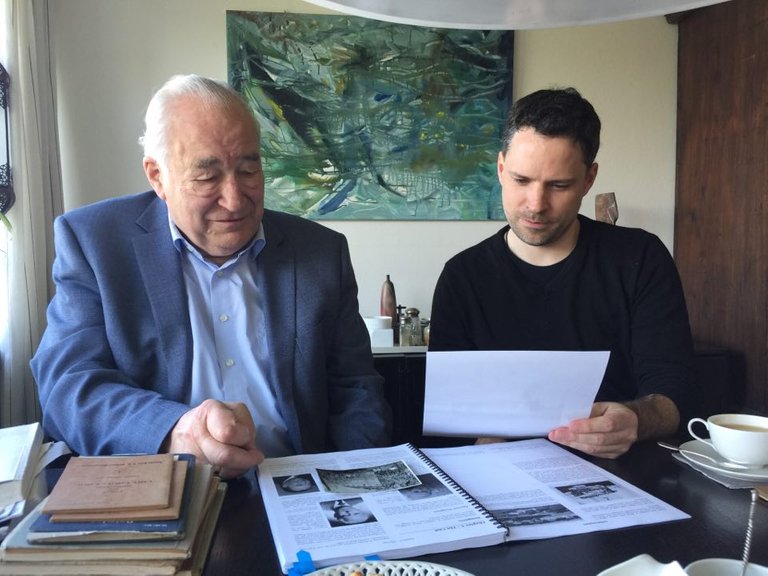
[Discussing his fathers engineering work on aircraft during WW2, he was 8 when he had to hide from bombing raids with his mother]
There are thousands of stories in dusty boxes in attics all over the world waiting for you to just ASK for them !
Research Lessons:
A) Use books as a way to find new archives and explore papers they reference, even if they have written about them
only a minuscule fraction of what is in each folder will be used by another author.
B) Most authors pay researchers to search folders for them, so they dont have to travel. This means the authors probably have not even SEEN most of the pages you will see if you go there in person. I estimate that I get about ten times the value in information terms by visiting in person. Nobody will know your subject well enough or what you want to get from it to email you photos, and unless you want to pay a thousand people for twenty years you will not even get one percent of the files photographed. Survey them yourself !
C) Do NOT read the files when you get there ! - Skim each folder to see if its useful, if it is - quickly photograph the whole thing. Your time is limited and you will cover five times the ground if you photograph it all and do the detail reading at home later. When the flight home is waiting, skim, is it useful ? Y/N - if yes, copy the whole file and move onto the next.
D) Take all your own camera equiptment and get a remote trigger for your camera. Most archives let you take your own photos, but will charge you a fortune if you ask them to copy pages for you.
E) Download two programs, thank me later !
https://lifehacker.com/5885278/files-2-folder-creates-new-folders-pre-populated-with-your-selected-files
Files-2-Folder allows you to transfer multiple photos to a new folder with any name you choose with one right mouseclick.
http://bulkrenameutility.co.uk
The best program ever written for the person who takes lots of photos, place all photos from each separate report into a new folder with Files-2-Folder, and then name that folder. I name my folders like so:
YYYY-MM-DD_REPORT-NUMBER_DESCRIPTION-OF-REPORT-AUTHOR_ARCHIVE-NAME
Bulk rename will now allow you to rename ALL the photos inside a folder with the NAME of that folder. So when you are viewing your page photographs later, when you are referencing your images in your book you just look at the image name. I chop off the date and archive name, and so all my photos are called REPORT-NUMBER_001 ... 002 ...003.
001 being the first page. This program saved me hours.
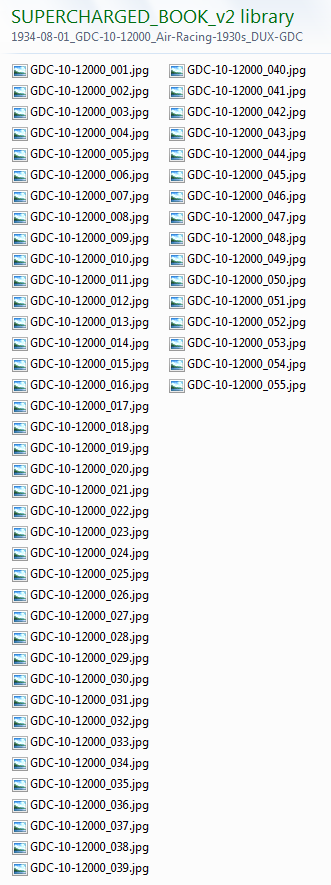
[how my images are named relative to the folder, using bulkRenameUtil]
F) NEVER write ANYTHING in your book from somewhere else without referencing it immidiately. You can get away with doing your references at the end in a ten page article, but once you have 50,000 images in your research library, you can easily loose where things came from FOR EVER, and never find them again.
G) There are lots of fancy programs for organizing research, I find them mostly too broadly designed to be workable. I organize them into folders, and by using the date format I have given you- Windows will AUTOMATICALLY order them into ascending date order! Your book has just structured itself !
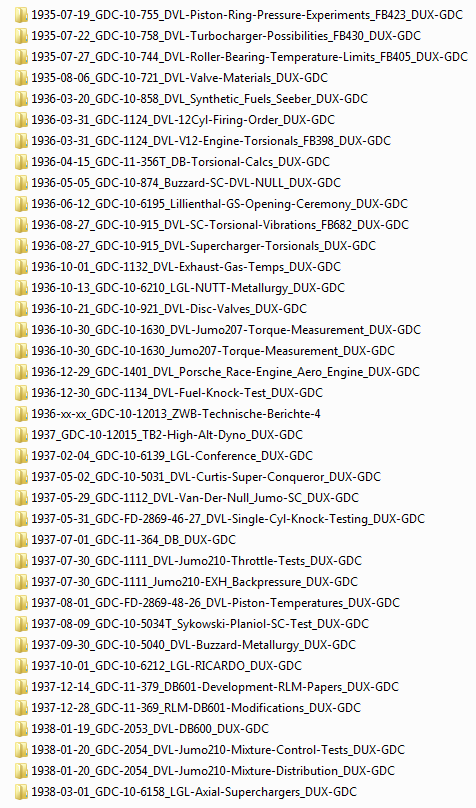
[how I structure my research in folders]
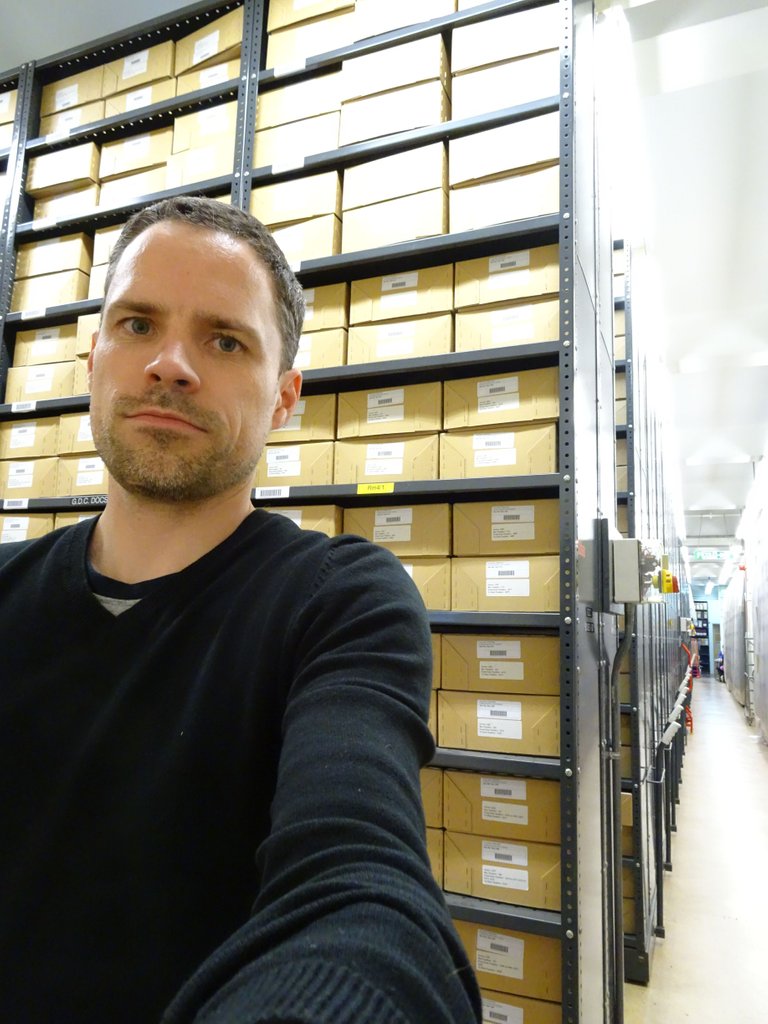
@calumdouglas
Love how you make it seem like a treasure hunt rather than a chore.
Thank you! for the organising tips.
Congratulations @calumdouglas! You received a personal award!
Click here to view your Board of Honor
Do not miss the last post from @steemitboard:
Congratulations @calumdouglas! You received a personal award!
You can view your badges on your Steem Board and compare to others on the Steem Ranking
Vote for @Steemitboard as a witness to get one more award and increased upvotes!